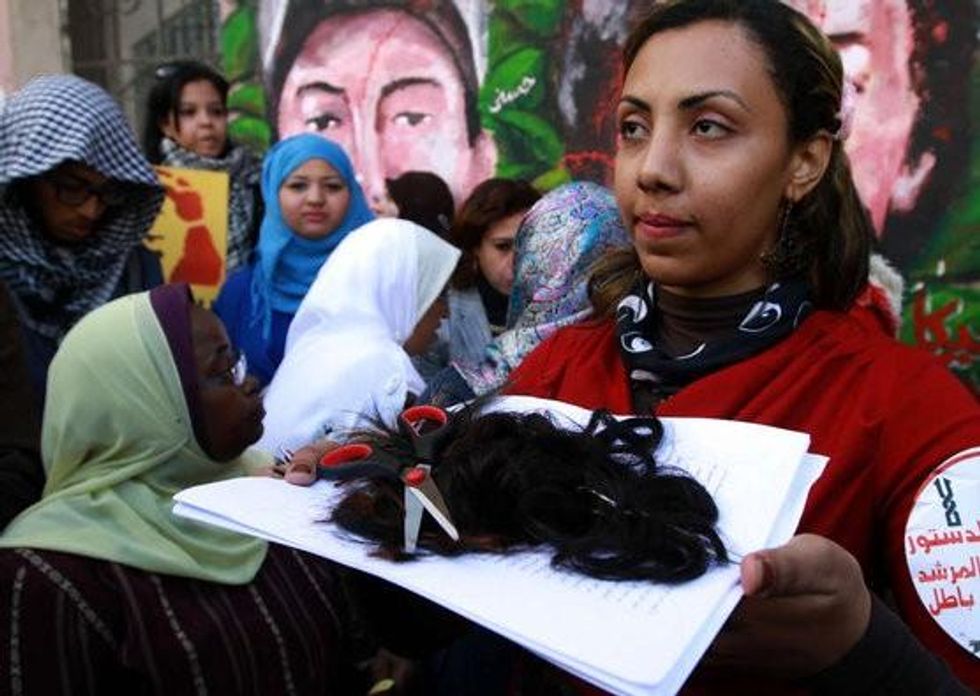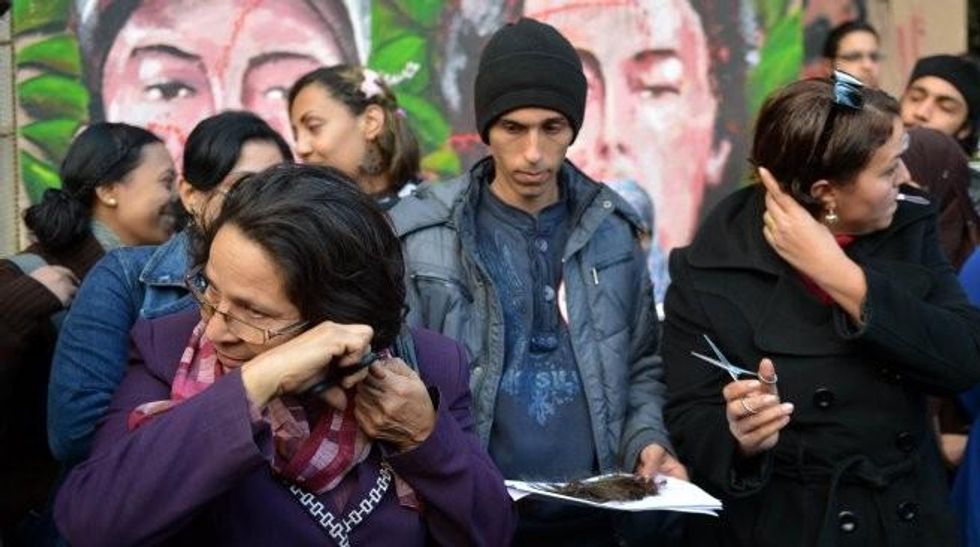

SUBSCRIBE TO OUR FREE NEWSLETTER
Daily news & progressive opinion—funded by the people, not the corporations—delivered straight to your inbox.
5
#000000
#FFFFFF
To donate by check, phone, or other method, see our More Ways to Give page.


Daily news & progressive opinion—funded by the people, not the corporations—delivered straight to your inbox.
Dozens of Egyptian women chopped their hair in Tahrir Square to protest the passage of Egypt's new, fundamentalist constitution--Egypt's first since the overthrow of former President Hosni Mubarak.
Holding up their shorn locks protesters chanted, "A woman's crown is her liberation!" and carried signs saying, "Your constitution is invalid," "Don't you dare try to marginalize the role of women," and "A woman's crown is not her hair, a woman's crown is her liberty."
The protest was held on Tuesday shortly before the national electoral commission announced that 64 percent of voters in the two-round referendum backed the new constitution; turnout was a scant 33 percent.
"They were upset by the passage of the new, Muslim Brotherhood constitution, and also by reports that fundamentalists stopped some women from going into polling stations to vote in the referendum on it," writes Middle East historian Juan Cole, adding, "They affirmed that they would continue peacefully to demonstrate, rally and camp out until the demands of the revolution were realized."
Daily News Egypt reports:
"Freedom costs a fortune," Fatma Sherif, one of the organizers of the protest, said, "it's not our hair which crowns us women; our freedom does."
Sherif stated that women have been subjected to oppression since the early days of the revolution. She recalled incidents such as subjecting women to virginity tests, dragging them in the streets and stripping them off their clothes to prevent them from protesting.
"In the end, they produce a constitution which doesn't protect our rights," said Sherif.
Christians and liberals boycotted the referendum in protest of changes they saw as weakening human rights, particularly those of women, and the possible introduction of a form of fundamentalist Islamic law, AFP reports.
Despite the opposition, the Islamist-dominated Shura Council convened on Wednesday to swear in 90 new members appointed by Egyptian President Mohamed Morsi.
Following the vote, Morsi immediately signed into law the charter, which had been written up by his Islamist allies.
According to Al Jazeera:
The charter gives the traditionally toothless upper house full legislative powers until elections for a new lower house is called within two months.
The upper house of parliament has taken over from Morsi, who had given himself the power to pass laws that led to days of violent protests.
_____________________


Dear Common Dreams reader, The U.S. is on a fast track to authoritarianism like nothing I've ever seen. Meanwhile, corporate news outlets are utterly capitulating to Trump, twisting their coverage to avoid drawing his ire while lining up to stuff cash in his pockets. That's why I believe that Common Dreams is doing the best and most consequential reporting that we've ever done. Our small but mighty team is a progressive reporting powerhouse, covering the news every day that the corporate media never will. Our mission has always been simple: To inform. To inspire. And to ignite change for the common good. Now here's the key piece that I want all our readers to understand: None of this would be possible without your financial support. That's not just some fundraising cliche. It's the absolute and literal truth. We don't accept corporate advertising and never will. We don't have a paywall because we don't think people should be blocked from critical news based on their ability to pay. Everything we do is funded by the donations of readers like you. Will you donate now to help power the nonprofit, independent reporting of Common Dreams? Thank you for being a vital member of our community. Together, we can keep independent journalism alive when it’s needed most. - Craig Brown, Co-founder |
Dozens of Egyptian women chopped their hair in Tahrir Square to protest the passage of Egypt's new, fundamentalist constitution--Egypt's first since the overthrow of former President Hosni Mubarak.
Holding up their shorn locks protesters chanted, "A woman's crown is her liberation!" and carried signs saying, "Your constitution is invalid," "Don't you dare try to marginalize the role of women," and "A woman's crown is not her hair, a woman's crown is her liberty."
The protest was held on Tuesday shortly before the national electoral commission announced that 64 percent of voters in the two-round referendum backed the new constitution; turnout was a scant 33 percent.
"They were upset by the passage of the new, Muslim Brotherhood constitution, and also by reports that fundamentalists stopped some women from going into polling stations to vote in the referendum on it," writes Middle East historian Juan Cole, adding, "They affirmed that they would continue peacefully to demonstrate, rally and camp out until the demands of the revolution were realized."
Daily News Egypt reports:
"Freedom costs a fortune," Fatma Sherif, one of the organizers of the protest, said, "it's not our hair which crowns us women; our freedom does."
Sherif stated that women have been subjected to oppression since the early days of the revolution. She recalled incidents such as subjecting women to virginity tests, dragging them in the streets and stripping them off their clothes to prevent them from protesting.
"In the end, they produce a constitution which doesn't protect our rights," said Sherif.
Christians and liberals boycotted the referendum in protest of changes they saw as weakening human rights, particularly those of women, and the possible introduction of a form of fundamentalist Islamic law, AFP reports.
Despite the opposition, the Islamist-dominated Shura Council convened on Wednesday to swear in 90 new members appointed by Egyptian President Mohamed Morsi.
Following the vote, Morsi immediately signed into law the charter, which had been written up by his Islamist allies.
According to Al Jazeera:
The charter gives the traditionally toothless upper house full legislative powers until elections for a new lower house is called within two months.
The upper house of parliament has taken over from Morsi, who had given himself the power to pass laws that led to days of violent protests.
_____________________


Dozens of Egyptian women chopped their hair in Tahrir Square to protest the passage of Egypt's new, fundamentalist constitution--Egypt's first since the overthrow of former President Hosni Mubarak.
Holding up their shorn locks protesters chanted, "A woman's crown is her liberation!" and carried signs saying, "Your constitution is invalid," "Don't you dare try to marginalize the role of women," and "A woman's crown is not her hair, a woman's crown is her liberty."
The protest was held on Tuesday shortly before the national electoral commission announced that 64 percent of voters in the two-round referendum backed the new constitution; turnout was a scant 33 percent.
"They were upset by the passage of the new, Muslim Brotherhood constitution, and also by reports that fundamentalists stopped some women from going into polling stations to vote in the referendum on it," writes Middle East historian Juan Cole, adding, "They affirmed that they would continue peacefully to demonstrate, rally and camp out until the demands of the revolution were realized."
Daily News Egypt reports:
"Freedom costs a fortune," Fatma Sherif, one of the organizers of the protest, said, "it's not our hair which crowns us women; our freedom does."
Sherif stated that women have been subjected to oppression since the early days of the revolution. She recalled incidents such as subjecting women to virginity tests, dragging them in the streets and stripping them off their clothes to prevent them from protesting.
"In the end, they produce a constitution which doesn't protect our rights," said Sherif.
Christians and liberals boycotted the referendum in protest of changes they saw as weakening human rights, particularly those of women, and the possible introduction of a form of fundamentalist Islamic law, AFP reports.
Despite the opposition, the Islamist-dominated Shura Council convened on Wednesday to swear in 90 new members appointed by Egyptian President Mohamed Morsi.
Following the vote, Morsi immediately signed into law the charter, which had been written up by his Islamist allies.
According to Al Jazeera:
The charter gives the traditionally toothless upper house full legislative powers until elections for a new lower house is called within two months.
The upper house of parliament has taken over from Morsi, who had given himself the power to pass laws that led to days of violent protests.
_____________________

